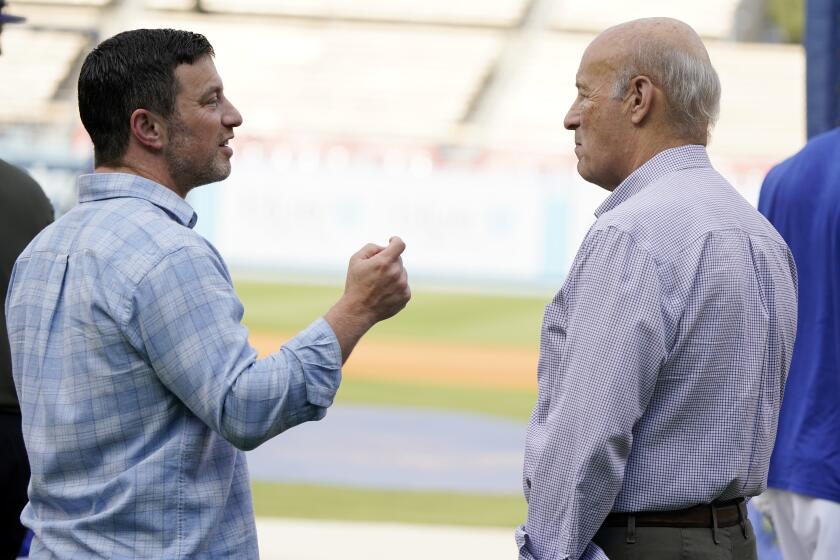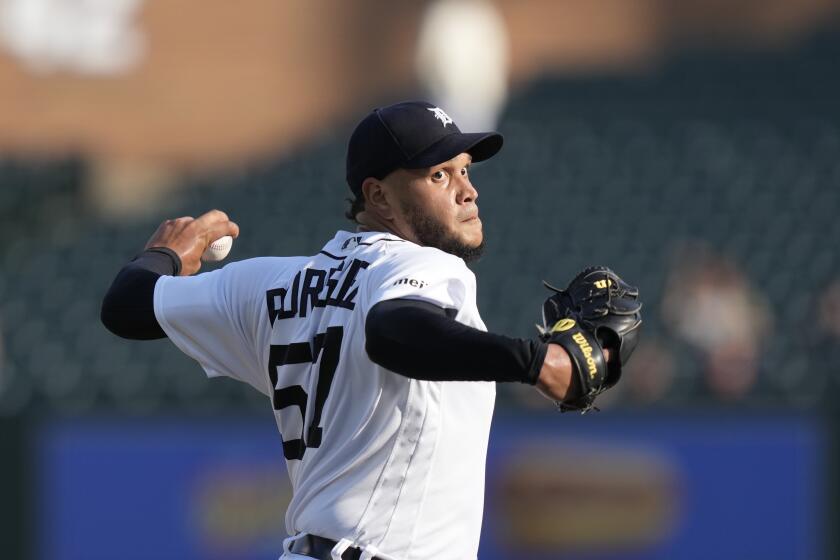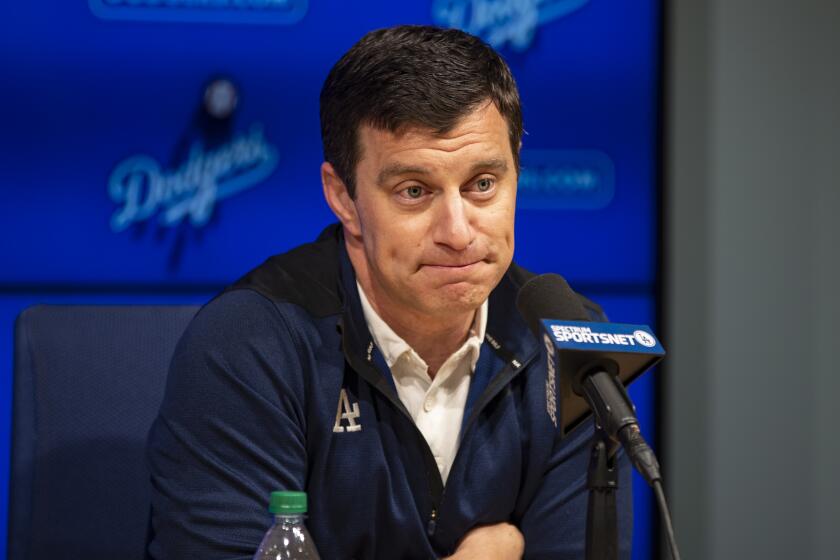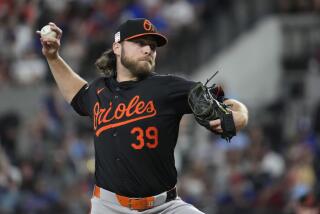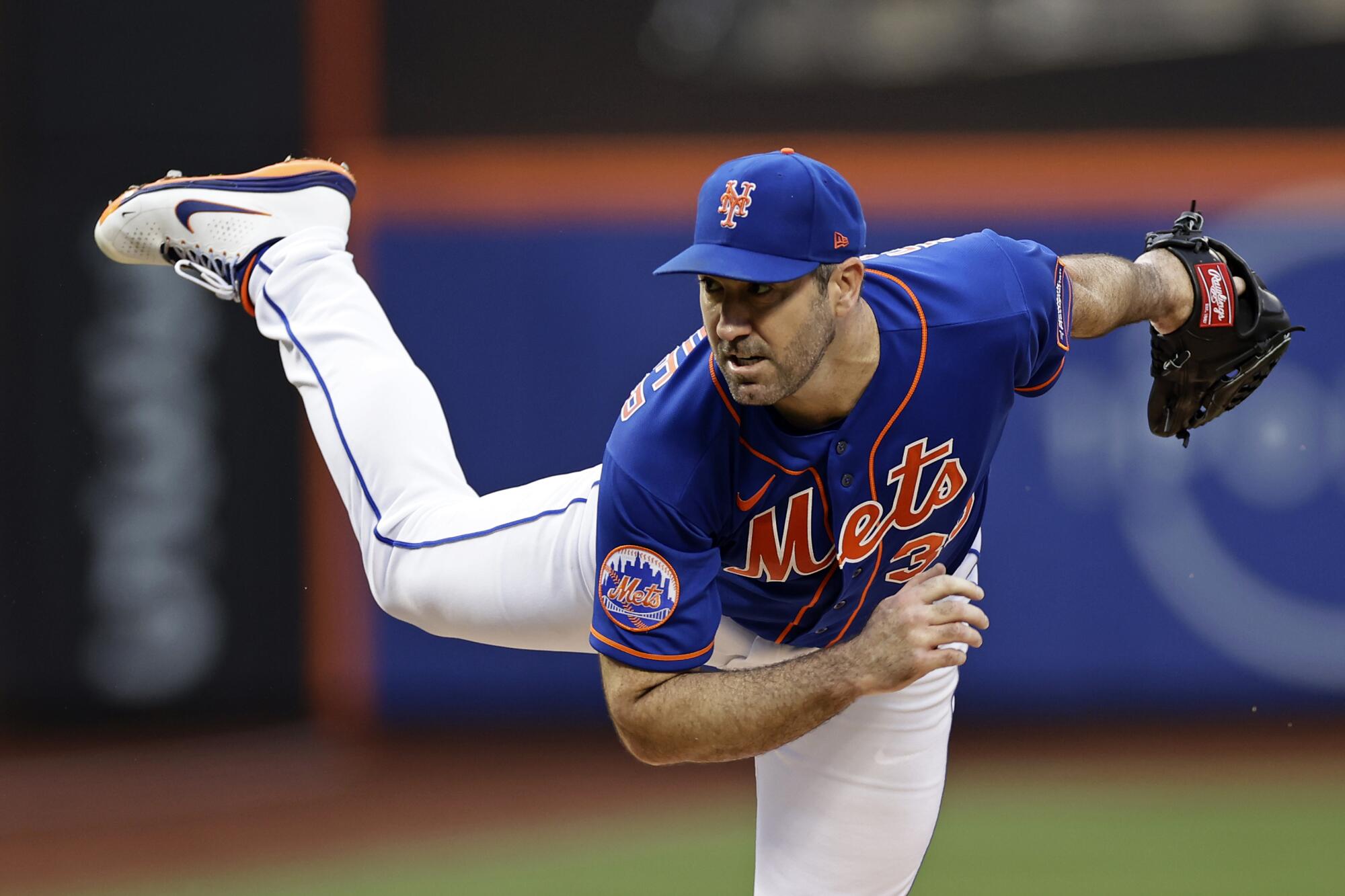
- Share via
At the start of trade deadline week, Andrew Friedman offered up a promise.
Though the Dodgers were in first place, and held the second-best World Series odds in the majors, according to FanGraphs’ computer models, the club’s president of baseball operations knew a big splash could be in order.
His team needed more right-handed bats. More reliable bullpen pieces. And a more power-packed rotation most of all.
So, eight days before the deadline, Friedman indicated the Dodgers were thinking big.
Andrew Friedman says the Dodgers want to win a World Series, but Dylan Hernández argues Friedman’s trade deadline actions suggest otherwise.
“To the extent that we can continue to reinforce or add to this nucleus,” he said on July 24, “we’re gonna look to do that and be aggressive as we can.”
That much, the Dodgers were.
They made a push for several players at the top of the trade market, from Lucas Giolito and Nolan Arenado last week, to Justin Verlander and Eduardo Rodriguez in the deadline’s final days.
Even after addressing some of their lesser needs early in the deadline frenzy, they felt a star addition could be within reach.
“[We were able] to really focus on more of the high-end, top end of the market,” Friedman said of the Dodgers’ efforts in the final days before Tuesday’s cutoff. “Having those [early trades] in the bank … we were able to spend our efforts and energy that way.”
In the end, however, each and every one of the Dodgers’ top targets slipped through their fingers — with high deadline prices, leveraged no-trade clauses and an unusually weak talent market, leaving the Dodgers without the impact addition they so desperately desired.
“For various different reasons for those top-end guys,” Friedman said, “it just didn’t work out.”
And for the rest of the season, they’ll have to wonder what might have been — embarking on the final stretch of their campaign with only modest reinforcements and myriad unanswered questions.
With the deadline now gone, here is a look back at the Dodgers’ numerous deadline pursuits, and why they ultimately failed to land any of the impact players they targeted over the last week.
Lucas Giolito: Too costly
The Dodgers got to work early last week with a couple of minor moves, acquiring right-handed platoon bats Kiké Hernández from the Boston Red Sox on July 25 and Amed Rosario from the Cleveland Guardians the next day — all at the total cost of two minor league relievers and embattled starter Noah Syndergaard.
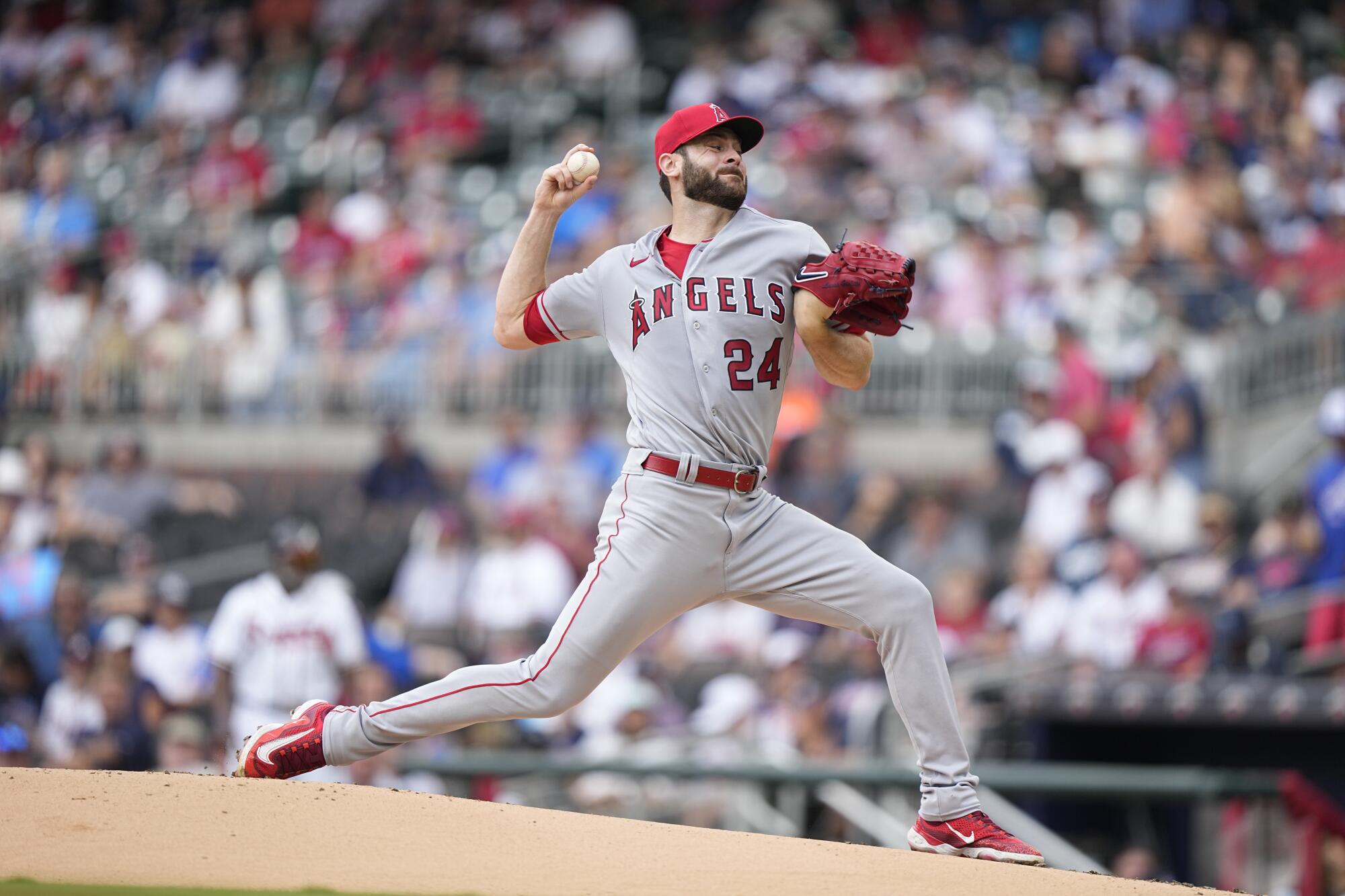
Behind the scenes, the team was already in the midst of its first big-name pursuit.
Giolito might not be one of the majors’ elite starters. But, with a solid 3.79 ERA and 1.22 WHIP this season, the former All-Star was viewed as one of the more desirable starting pitchers set to be dealt at the deadline — the kind of established veteran arm that could upgrade a Dodgers rotation with the sixth-worst starting pitching ERA (4.75) in the majors.
Thus, early last week, the team engaged the White Sox in advanced talks for the pitcher, according to one person with knowledge of the situation unauthorized to speak publicly.
In a sign of things to come, sky-high prices quickly became an impediment.
On the same day the Angels decided to pull Shohei Ohtani off the market, they also swooped in on Giolito and White Sox reliever Reynaldo López, offering two top prospects in catcher Edgar Quero and left-handed pitcher Ky Bush.
It was a bid the Dodgers could have bettered, one person said, particularly if the team included one of its own highly-touted catching prospects, Dalton Rushing or Diego Cartaya, in the deal.
After failing to trade for Justin Verlander, the Dodgers agreed to a deal with the Detroit Tigers for Eduardo Rodriguez, only to have the left-hander invoke his no-trade clause.
Friedman and the front office decided against a counter bid, however, unwilling to part with premium young talent for potentially only two months of Giolito, who will be a free agent this winter.
Thus, Giolito went to Anaheim. A day later, the Dodgers agreed on a smaller trade with the White Sox, adding potential upside pitchers Lance Lynn and Joe Kelly in exchange for outfielder Trayce Thompson and mid-level pitching prospects Nick Nastrini and Jordan Leasure.
With another box checked off their deadline to-do list — adding experienced pitching depth — the Dodgers then set their sights even higher.
Nolan Arenado: An unlikely blockbuster
First, they made a Hail Mary run at Arenado, the superstar St. Louis Cardinals third baseman who was believed to be willing to waive a no-trade clause in his contract in order to facilitate a move to Los Angeles.
It was a long shot from the start. Arenado is a cornerstone for the Cardinals. And even though they were out of contention for this season, they had him under a relatively team-friendly contract for four more years.
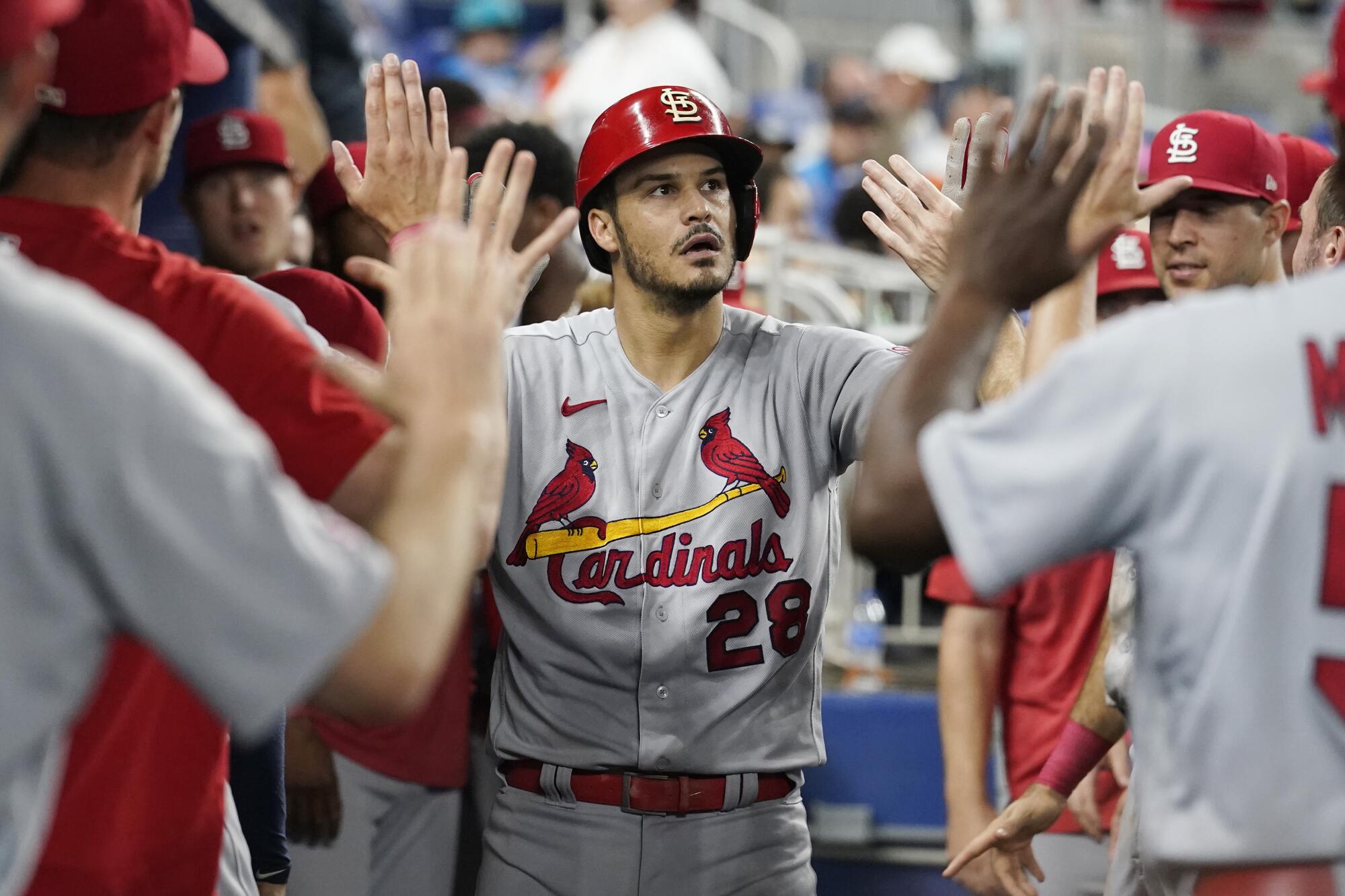
St. Louis trading him would have been a “significant surprise,” according to one person with knowledge of the situation.
Nonetheless, the Dodgers kicked the tires. They had a bevy of young arms with which to entice the pitching-hungry Cardinals. The Dodgers had a long-term need for Arenado, too, with their third base plans beyond this season — the last of Max Muncy’s contract, unless the Dodgers pick up his club option in 2024 — unclear.
Speculation surrounding the potential blockbuster reached its peak Friday, when Arenado declined to tell St. Louis media members if he would potentially invoke his no-trade clause to stay with the Cardinals.
By the next day, though, the situation had fizzled. Cardinals president John Mozeliak announced Arenado would be staying put. And in hindsight, members of the Dodgers front office doubted a trade for the eight-time All-Star was ever actually all that feasible.
Justin Verlander: Astros interference
With Arenado off the board, the Dodgers turned their full attention back toward the pitching market, casting a wide net for potential targets, according to people with knowledge of the club’s thinking.
They inquired about controllable young starters, such as Mitch Keller of the Pittsburgh Pirates and Brady Singer of the Kansas City Royals. They considered other short-term rentals, such as pending free agents Jordan Montgomery and Jack Flaherty of the Cardinals. They considered high-end relief help, too, including the Cardinals’ Jordan Hicks and the Seattle Mariners’ Paul Sewald.
With the prices for those names exceeding its comfort zone, however, the team narrowed its focus on a couple of high-profile names — the biggest one being Verlander, the decorated New York Mets ace.
A deal for Verlander would have been complicated.
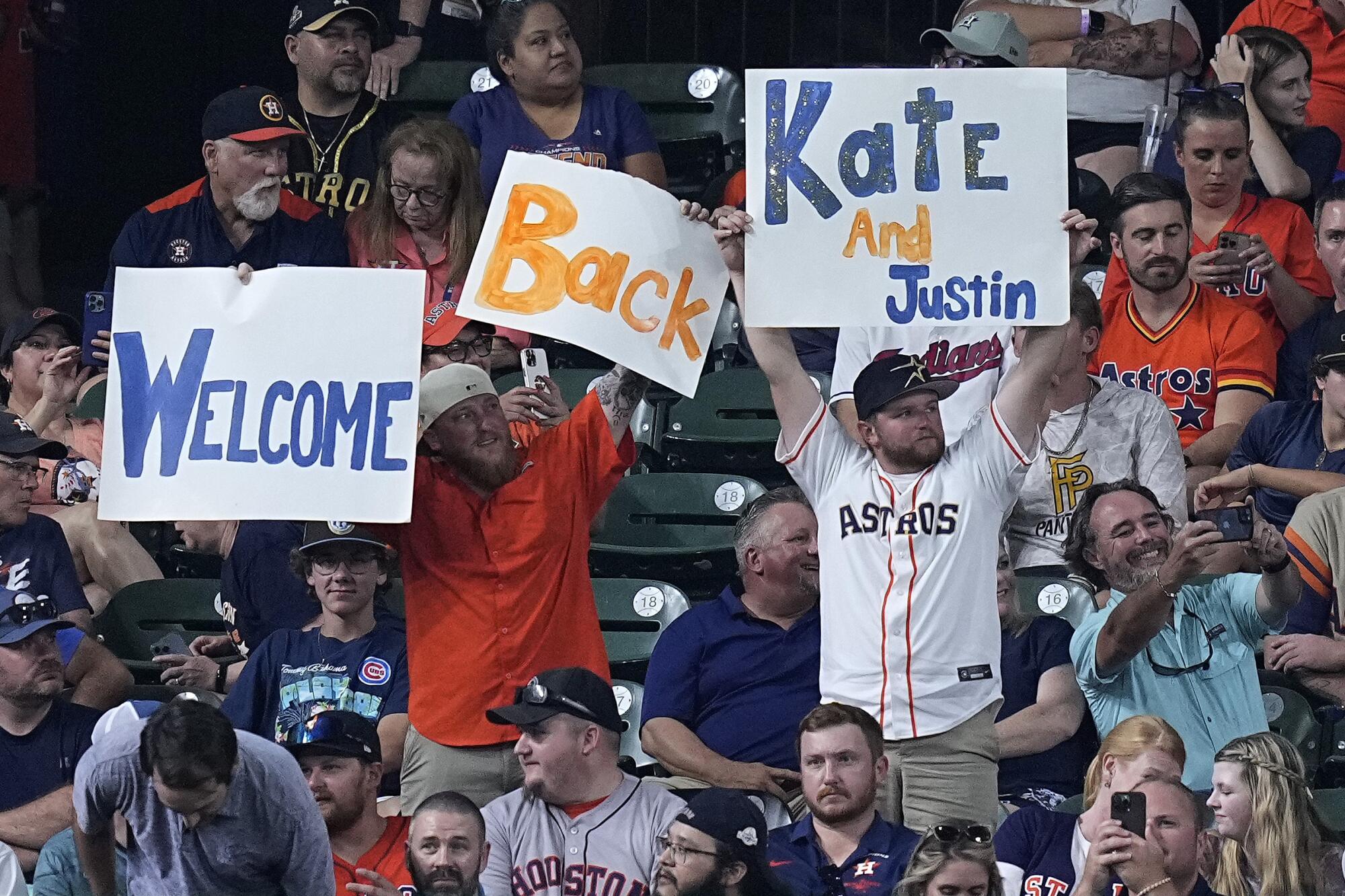
While the Dodgers had offered Verlander a two-year, $80-million contract as a free agent deal this winter (just shy of the Mets’ winning two-year, $86.67-million bid), New York also gave the 40-year-old a vesting option of $35 million in 2025, which would kick in if he pitches 140 innings next season.
The Dodgers wanted the Mets to pay down some of that extra money, like they did to trade Max Scherzer to the Texas Rangers earlier in the week. In return, the Mets wanted a significant prospect haul, eyeing some of the Dodgers’ crop of young pitching prospects.
A gulf existed between the teams. Still, as of Monday afternoon, a pathway to an agreement seemed possible.
Until Jim Crane and the Houston Astros got in the way.
Though the Astros let Verlander walk in free agency this winter, the pitcher maintained a close connection to the club, where he two World Series in 2017 and 2022, and their owner, Crane, in particular.
Because Verlander had a no-trade clause, the industry belief was that, if the Astros made a competitive offer for Verlander, he would steer himself there over any other team.
For a period of time over the weekend, the Astros’ interest appeared to be waning. Their general manager, Dana Brown, went as far as saying Sunday that the team was out of the starting pitching market.
But then, Crane reportedly pushed his team back into the Verlander sweepstakes, desiring a reunion with the future Hall of Famer in hopes of repeating as World Series champion.
By Tuesday morning, the Dodgers effectively ceased their chase for Verlander, who was dealt to Houston for two top prospects in the afternoon.
“His preference was to go to one team where he did go,” Friedman said. “We knew that one was going to be tough unless that team wasn’t in.”
With only hours to go before the deadline, and the Dodgers’ glaring need for upper-end starting pitching still unmet, the team pivoted to the last big-name target still left on its wish list.
Eduardo Rodriguez: Rebuffed by a no-trade clause
Like Verlander, and Arenado, and even Lynn, Rodriguez also had a no-trade clause in his contract, with the Dodgers listed as one of 10 teams he could veto a deal with.
From the start of the Dodgers’ negotiations with the Tigers about the 30-year-old left-hander, however, such a scenario was seen as unlikely. Detroit was in fourth place. The Dodgers had World Series aspirations. And though Rodriguez’s career numbers were only slightly above average, his breakout performance this year — a 2.95 ERA and 1.03 WHIP — made him an obvious fit for the Dodgers.
So, the sides worked toward a deal, finally hammering out an agreement Tuesday that would have landed the team its long-sought, front-line starting pitcher.
The only problem: Rodriguez wouldn’t budge on his no-trade clause.
It wasn’t a problem the Dodgers had anticipated, Friedman said. Though they’d never been directly told Rodriguez would waive his no-trade clause, “there was every reason to believe that he would, from various conversations,” Friedman said.
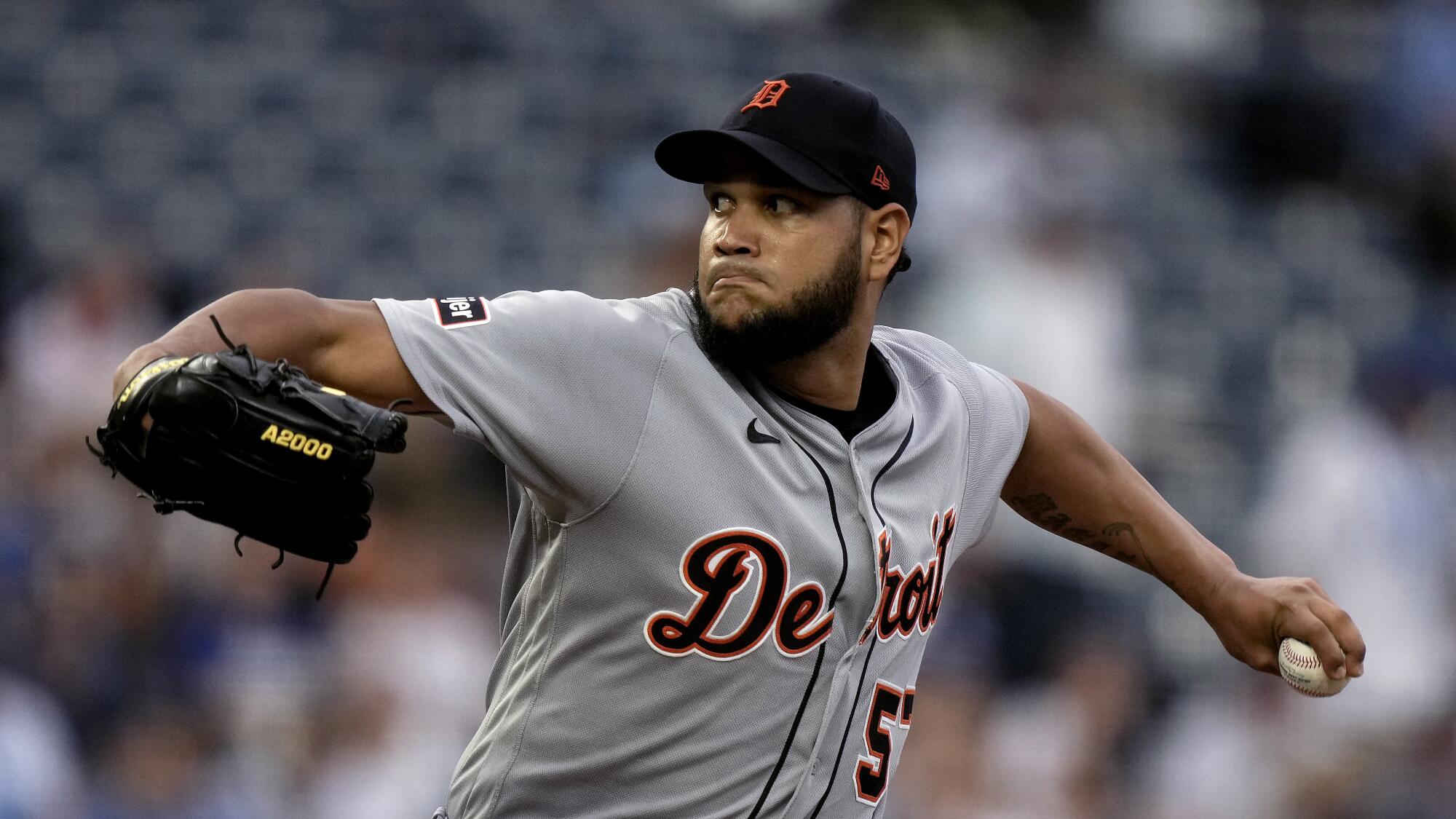
Instead, when it came time to execute the deal, Rodriguez informed the Tigers he wouldn’t give his approval. His preference was to stay in Detroit to be closer to his family in Miami. And there were evidently no incentives the Dodgers could offer him to change his mind.
“We had a couple conversations, but the details of the [Dodgers] trade wasn’t right where I wanted for me and my family,” Rodriguez told members of the Detroit media on Wednesday, declining to give a more specific explanation. “That’s something that is just between them and me, so I can’t tell you.”
Exactly how the Tigers and Dodgers got so far down the line on the trade, without knowing it would be vetoed by Rodriguez, became an immediate point of industry speculation.
It’s strange to see one of the most hard-throwing executives in baseball get torched during the trade deadline, but, make no mistake: Friedman’s aura has been lit up.
Multiple rival front office executives, speaking on condition of anonymity, said it is generally the responsibility of the team trading a top player away (in this case, the Tigers) to ensure a no-trade clause will be waived.
Some members of the Dodgers raised an eyebrow at the situation. The team’s roster includes several former teammates and friends of Rodriguez. As MLB.com reported, some Dodgers players had tried communicating with Rodriguez leading up to the deadline, trying to sway him to come to Los Angeles.
“I sent a couple texts,” said outfielder David Peralta, who was teammates with Rodriguez in the World Baseball Classic this year. “But I’m pretty sure he was going through a lot of crazy stuff. … We wanted him. But I respect his decision.”
In the end, Rodriguez refused to change his mind. Just hours away from the deadline, the Dodgers’ last best shot at a major deal was dead.
“We didn’t expect it at all,” Friedman said.
Rodriguez’s agent, Gene Mato, said in a statement: “Once I was granted permission to speak with [the Dodgers] regarding the trade, we did our best to come up with a way to make it happen where everyone was comfortable with the outcome. Unfortunately, we just ran out of time.”
Settling for small upgrades
Once the Rodriguez trade was off the table, there were few realistic paths for the Dodgers to pivot toward.
The White Sox were listening to offers on Dylan Cease, a right-handed ace with two more seasons of team control, but the Dodgers never made what would have had to be an astronomical bid, according to a person with knowledge of the situation.
The Dodgers reportedly checked in on Boston Red Sox left-hander James Paxton, but also found his price to be too steep.
They did manage to add one more pitcher, acquiring left-handed swingman Ryan Yarbrough in the deadline’s closing minutes. But by the time the 3 p.m. cutoff struck, the team’s biggest need was still unmet, their repeated pursuits of star talent all failing to materialize.
“We’ve targeted high-end guys a lot of deadlines,” Friedman said. “Sometimes it’s worked out and sometimes it hasn’t.”
Despite suffering the latter this year, the Dodgers still voiced optimism about their contention chances.
They think Hernández and Rosario will add versatility to their lineup. They believe Lynn and Kelly are primed for improved performances.
They also are confident in their current core, hopeful that a nucleus of Mookie Betts, Freddie Freeman, Will Smith, Clayton Kershaw and Julio Urías can lead a title chase — if they’re all healthy and playing well.
“We had a first-place team going into the day, and we have a first-place team coming out of tonight,” Freeman said Tuesday. “We love the team we have.”
Still, after their inability to make more significant deadline upgrades, the Dodgers have given themselves precious little margin for error.
There was a reason, after all, they targeted such big-name players. And if they fail to win a World Series this year, their lack of deadline activity will be one of first storylines to be second-guessed.
“We feel really good about the team that we have and the depth we have behind it,” Friedman said. “That said, you always want to feel even better.”
More to Read
Are you a true-blue fan?
Get our Dodgers Dugout newsletter for insights, news and much more.
You may occasionally receive promotional content from the Los Angeles Times.

